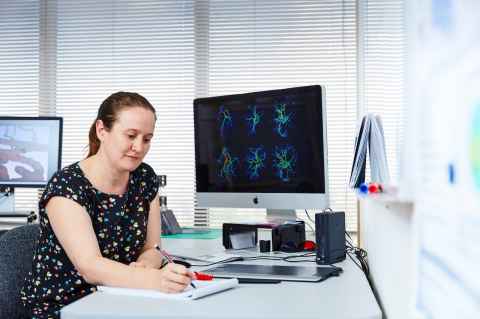Pregnancy Health Group
New technologies to detect problems in pregnancy earlier, and more reliably.

The Pregnancy Health group aims to improve health in pregnancy and early childhood by providing a better understanding of physiology in the critical developmental period. We use data-driven computational models to provide a new understanding of the important contributors to healthy development and to interpret clinical data obtained in early-life.
Our Research
A major contributor to poor fetal health in pregnancy is dysfunction of the placenta. The placenta is a unique organ which develops on demand and interacts physically with mum’s uterus to maintain a supply of oxygen to baby. Problems with the placenta are associated with serious complications of pregnancy. We know that the placenta and uterus can have an altered structure in complicated pregnancies, but we don't know whether this abnormal structure is a cause or consequence of the pregnancy complication. As tissue structure changes so quickly during pregnancy and many imaging procedures are too invasive to be used on pregnant women. We are piecing together evidence that describes normal and abnormal uterus and placental structure and function through pregnancy to develop a ‘Virtual Pregnancy’. We are using this virtual pregnancy to better understand what can go wrong in pregnancy and to help develop tools to identify 'at risk' pregnancies more accurately.
Selected Publications
- James et al. Trophoblast plugs: impact on utero-placental haemodynamics and spiral artery remodeling. Human Reproduction. 2018. 33(8), 1430-1441.
- Clark et al. Understanding abnormal uterine artery Doppler waveforms: a novel computational model to explore potential causes within the utero-placental vasculature. Placenta. 2018. 66:74-81.
- James, Chamley & Clark. Feeding your baby in utero: How the uteroplacental circulation impacts pregnancy. Physiology, 2017. 32(3):234-245.
- Saghian et al. Association of placental jets and mega jets with reduced villous density. Journal of Biomechanical Engineering, 2017. 139(5):051001.
- Lin et al. A multiscale model of placental oxygen exchange: The effect of villous tree structure on exchange efficiency. Journal of Theoretical Biology, 2016. 408(7):1-12.
- James et al. Quantifying trophoblast migration: In vitro approaches to address in vivo situations. Cell Adhesion & Migration, 2015. 10(1-2):77-87.
- Clark et al. Multiscale modelling of the feto–placental vasculature. Interface Focus, 2015. 5:20140078.